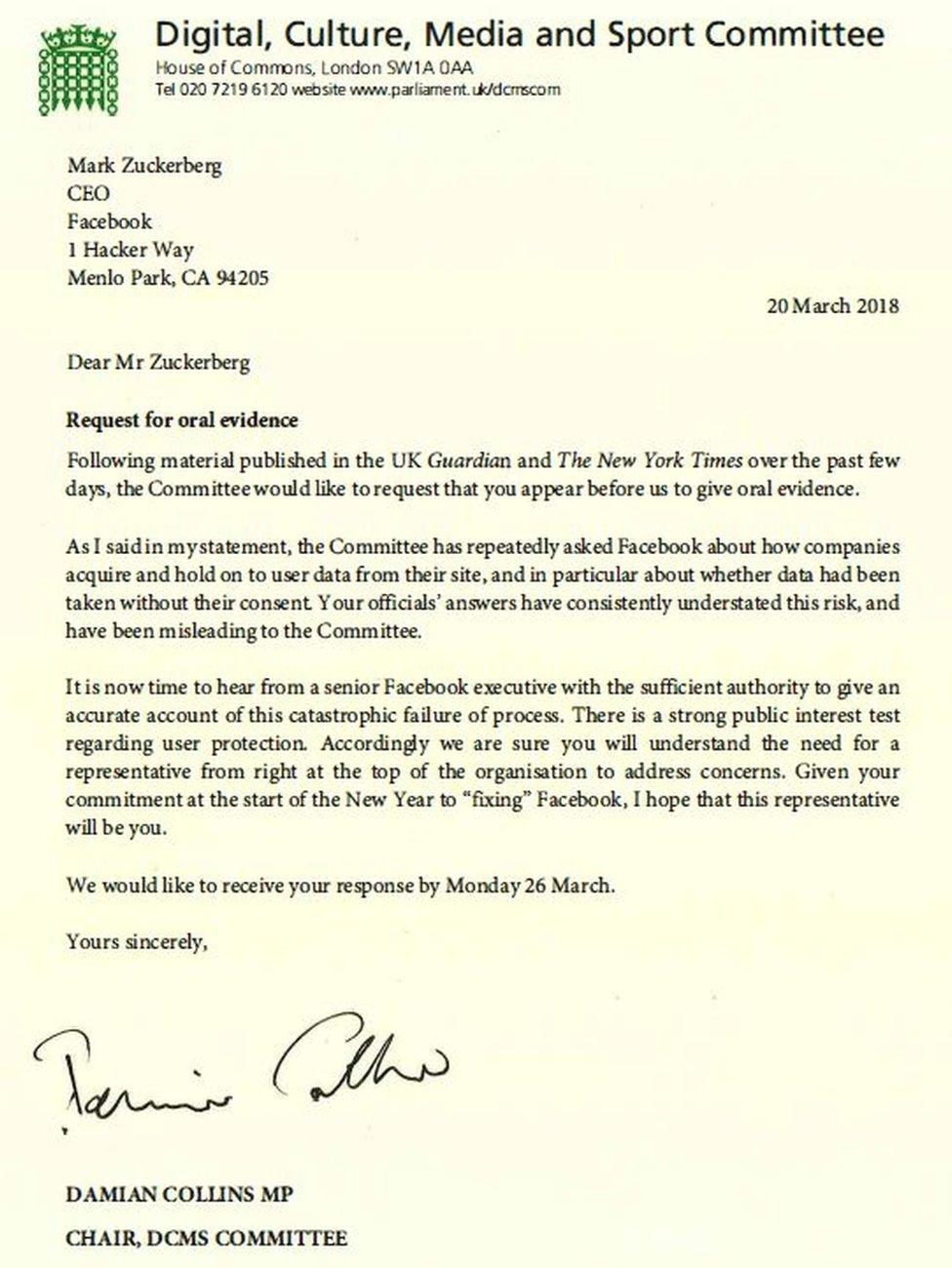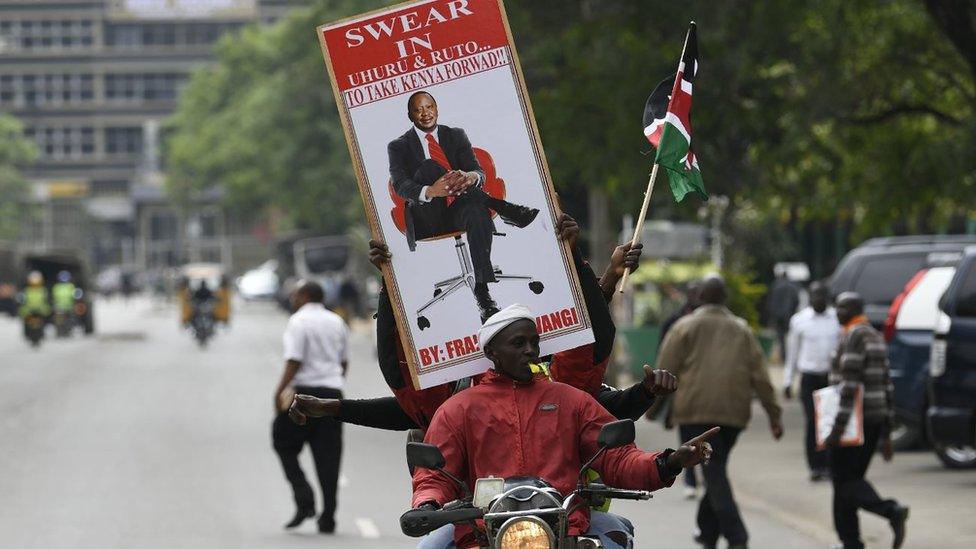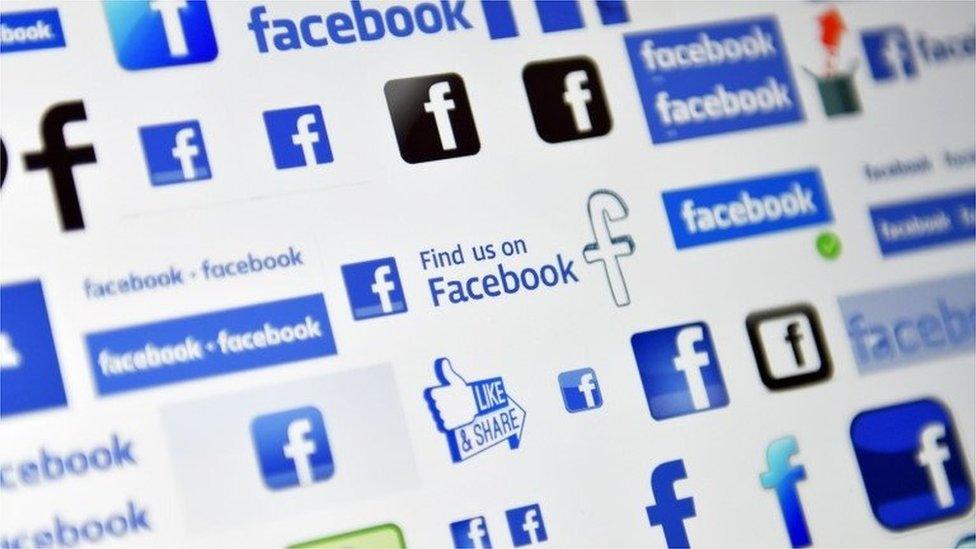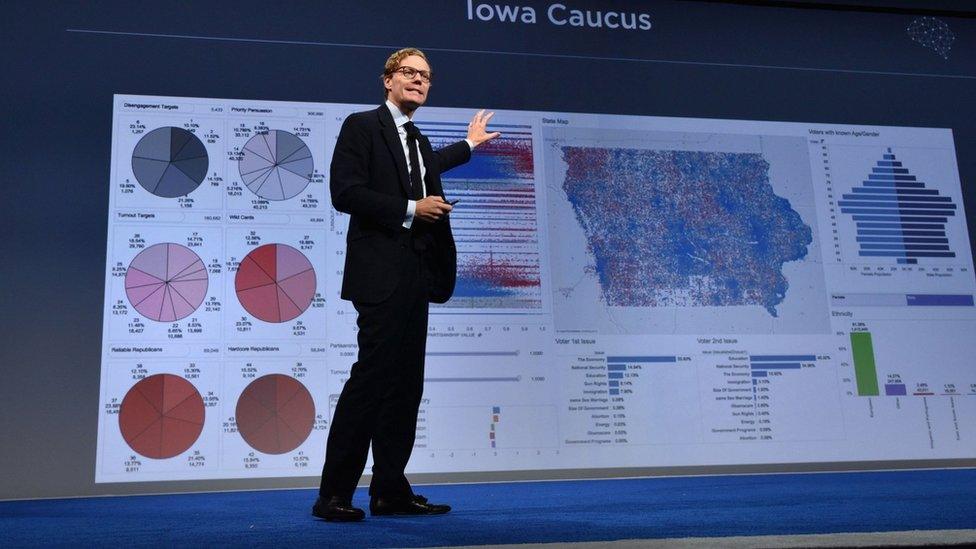Cambridge Analytica: Facebook boss summoned over data claims
- Published
Alexander Nix, CEO of Cambridge Analytica was filmed by undercover reporters for Channel 4 News
Facebook boss Mark Zuckerberg has been called on by a parliamentary committee to give evidence about the use of personal data by Cambridge Analytica.
The consulting firm is accused of harvesting the data of 50 million Facebook users without permission and failing to delete it when told to.
Damian Collins, the chairman of the Commons inquiry into fake news, accused Facebook of "misleading" the committee.
London-based firm Cambridge Analytica denies any wrongdoing.
Both companies are under scrutiny following claims by a whistleblower, Christopher Wylie, who worked with Cambridge Analytica and alleges it amassed large amounts of data through a personality quiz on Facebook called This is Your Digital Life.
He claims that 270,000 people took the quiz, but the data of some 50 million users, mainly in the US, was harvested without their explicit consent via their friend networks.
Mr Wylie says that data was sold to Cambridge Analytica, which then used it to psychologically profile people and deliver pro-Trump material to them, with a view to influencing the outcome of the 2016 presidential election.
In a letter to Mr Zuckerberg, Mr Collins accused Facebook of giving answers "misleading to the Committee" at a previous hearing which asked whether information had been taken without users' consent.
He said it was "now time to hear from a senior Facebook executive with the sufficient authority to give an accurate account of this catastrophic failure of process".
Requesting a response to the letter by 26 March, the MP added: "Given your commitment at the start of the New Year to "fixing" Facebook, I hope that this representative will be you."
His intervention comes after the UK's Information Commissioner Elizabeth Denham said she would be applying to court for a warrant to search the offices of Cambridge Analytica.
The firm insists it followed the correct procedures in obtaining and using data, but it was suspended from Facebook last week.
President Donald Trump welcomed any investigation into Cambridge Analytica as "Americans' privacy should be protected", according to a deputy press secretary at the White House.


Facebook shares fell by a further 5% on Tuesday, following a 6.7% drop on Monday, meaning that in total, about $50bn has been wiped from its market value.
The company held an open meeting with its employees on Tuesday to discuss the matter, but the BBC's North America technology reporter Dave Lee said neither Mr Zuckerberg nor his deputy, Sheryl Sandberg, chaired it.
They have not spoken publically since the story about Cambridge Analytics broke last week, he added.
Meanwhile, consumer watchdog the US Federal Trade Commission - which has the power to levy large fines - has reportedly opened an investigation into Facebook.
Undercover filming
Dr Aleksandr Kogan, who created the personality app from which the data had been harvested, is a senior research associate at the University of Cambridge.
A spokesman from the university said they had "sought and received assurances" from Dr Kogan that no University data, resources or facilities were used for his work and they had found no evidence to contradict that.
However, he confirmed the university was writing to Facebook to "request all relevant evidence in their possession".
Meanwhile, Channel 4 News, external has also broadcast hidden camera footage in which Cambridge Analytica chief executive Alexander Nix appears to suggest tactics his company could use to discredit politicians online.
Former Cambridge Analytica employee Christopher Wylie says the firm planted fake news
In the footage, asked what "deep digging" could be done, Mr Nix told an undercover reporter: "Oh, we do a lot more than that."
He suggested one way to target an individual was to "offer them a deal that's too good to be true and make sure that video's recorded".
He also said he could "send some girls around to the candidate's house..." adding that Ukrainian girls "are very beautiful, I find that works very well".
Mr Nix continued: "I'm just giving you examples of what can be done and what has been done."
Channel 4 News said its reporter had posed as a fixer for a wealthy client hoping to get a political candidate elected in Sri Lanka.
Mr Nix spoke to BBC Newsnight before the Channel 4 report was aired on Monday night. He declined to be interviewed after the undercover footage was broadcast
However, Cambridge Analytica said the report had "grossly misrepresented" the conversations caught on camera.
"In playing along with this line of conversation, and partly to spare our 'client' from embarrassment, we entertained a series of ludicrous hypothetical scenarios," the company said in a statement.
"Cambridge Analytica does not condone or engage in entrapment, bribes or so-called 'honey traps'," it said.
Mr Nix told the BBC's Newsnight programme he felt the firm had been "deliberately entrapped".
On its website, Cambridge Analytica says it can provide data and insights to "drive your voters to the polls and win your campaign" and says it has played a "pivotal role" in winning US presidential races.

How to protect your data on Facebook
There are a few things to be aware of if you want to restrict who has access to your data.
Keep an eye on apps, especially those which require you to log in using your Facebook account - they often have a very wide range of permissions and many are specifically designed to pick up your data
Use an ad blocker to limit advertising
Look at your Facebook security settings and make sure you are aware of what is enabled. Check the individual app settings to see whether you have given them permission to view your friends as well as yourself.
You can download a copy of the data Facebook holds on you, although it is not comprehensive. There is a download button at the bottom of the General Account Settings tab. However bear in mind that your data may be less secure sitting on your laptop than it is on Facebook's servers, if your device is hacked.
You can of course, simply leave Facebook, but the campaign group Privacy International warns that privacy concerns extend beyond the social network.
"The current focus is on protecting your data being exploited by third parties, but your data is being exploited all the time," said a spokeswoman.
"Many apps on your phone will have permission to access location data, your entire phone book and so on. It is just the tip of the iceberg."
- Published20 March 2018

- Published21 March 2018

- Published19 March 2018
- Published19 March 2018
- Published18 March 2018
